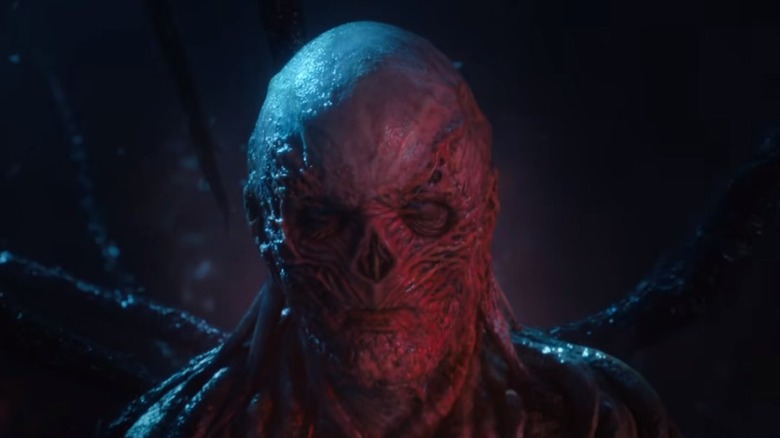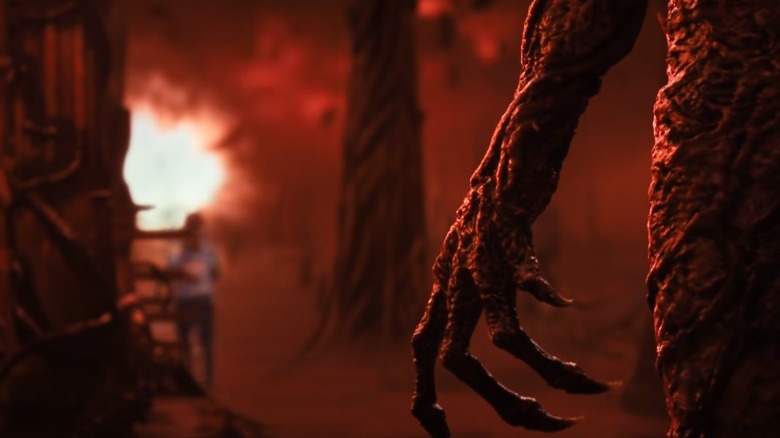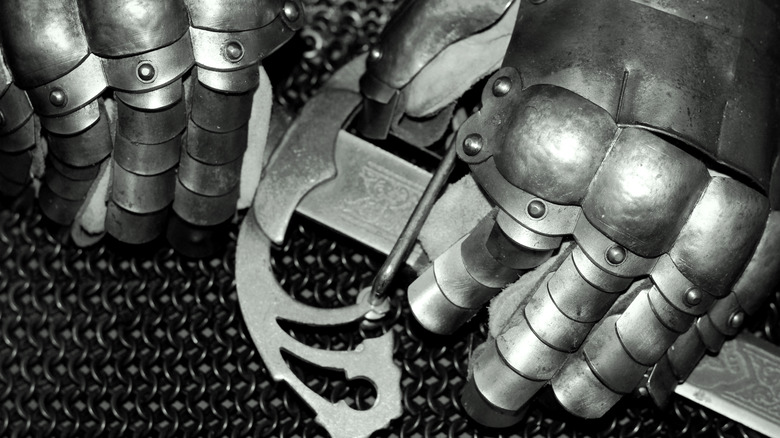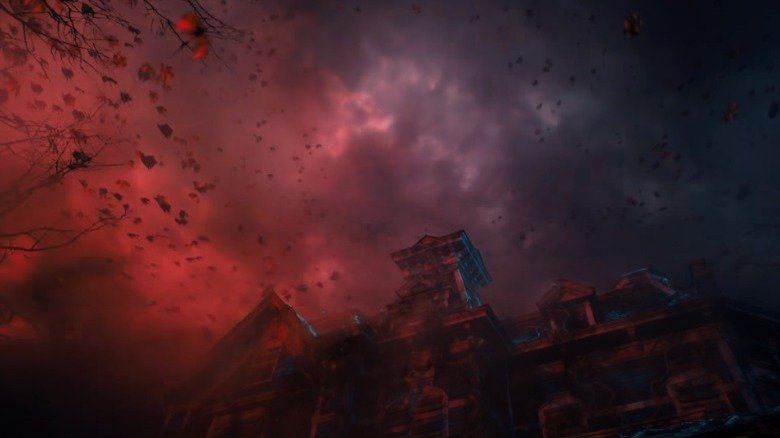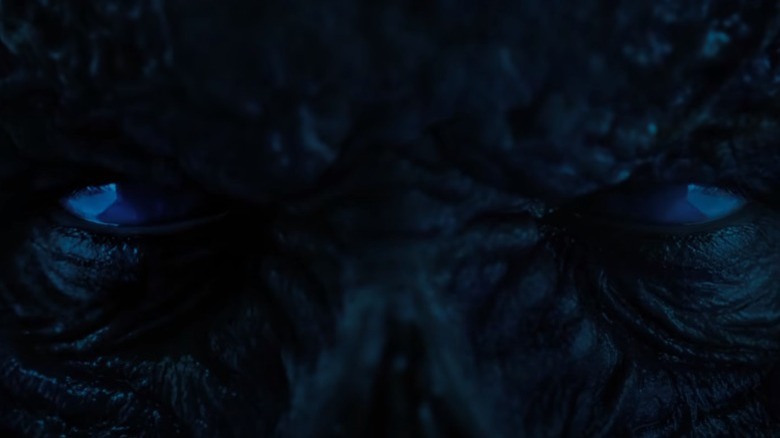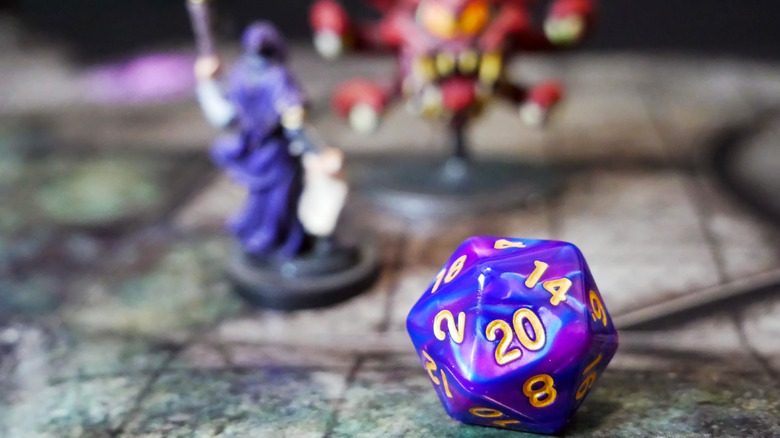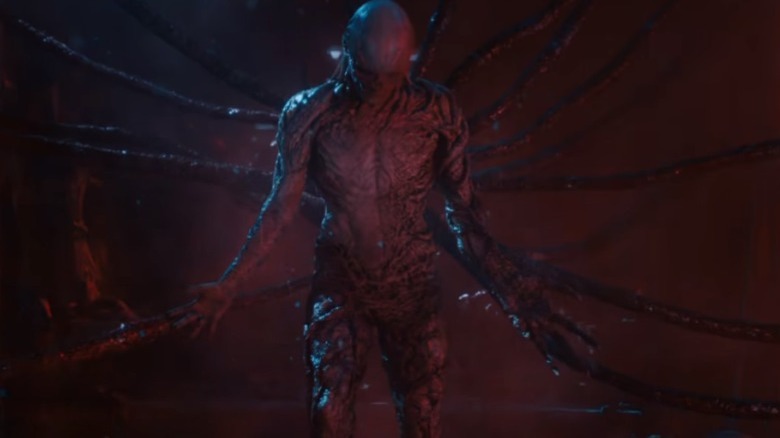The History Of Vecna From Dungeons & Dragons
We may receive a commission on purchases made from links.
When it was revealed that the big baddie of "Stranger Things 4" was Vecna, everyone who had ever played a serious game of D&D in the last 4 decades collectively went, "Ooohh!" And then, they went, "Uh-oh." If there's one thing that can be said about the bad guys of Dungeons & Dragons, it's that they're incredibly complex. They're also terrifying, and vampires? That's for amateurs.
Vecna's is one of the names that no one wants to see pop up in their campaign ... at the same time, they kind of do. He's often mentioned along with other ultra-powerful characters like Tiamat, Strahd, Lord Soth, Orcus, and — of course — creatures who have already been name-checked in "Stranger Things," like the Demogorgon. But naming this new threat after Vecna is seriously doubling down.
That said, the character in the show obviously isn't D&D's Vecna, he's just called that by the group of D&D-playing kids we've all come to know and love. There are a few things that make him reminiscent of the original Vecna, but the two characters diverge pretty drastically ... especially once it's revealed exactly who the "Stranger Things" version is. So, who's the OG Vecna? Let's talk ... about secrets.
Using Vecna is a bit anachronistic
The Dungeons & Dragons version of Vecna has been around for a long time — but he's had a slow start. He was originally created by Brian Blume, who was a tool and die maker as well as one of the co-founders of TSR — along with Gary Gygax. He kicked off Vecna's story by creating not the character, but two artifacts: The Hand of Vecna, and the Eye of Vecna. (Blume didn't live to see Vecna used in "Stranger Things" — Haase-Lockwood & Associates Funeral Homes says that he passed away in 2020, from Lewy Body Dementia and Parkinson's.)
And as CBR says, that's all there was to Vecna for about the first 10 years of D&D legends and lore. Players only knew him by his artifacts ... until the release of AD&D Second Edition. That came out in 1989, and it was in this edition that Vecna finally got fleshed out. (See what we did there?)
But here's where we hit a little bit of a real-life problem. "Stranger Things 4" is set in 1986 (via the LA Times), and at the time the kids from Hawkins were looking for a D&D-inspired big bad guy to label the creature breaking through from the Upside Down, Vecna would have only been known to them as the source of some very disturbing artifacts. He wouldn't yet be the nearly unstoppable force he would eventually become, but given the whole "missing eyes" thing, the Hawkins kids get cut a little slack.
He was originally just his artifacts
It's kind of fitting that Vecna was originally only known through his magical artifacts. As Polygon says, his name was an anagram Vance: It was a nod to Jack Vance, who wrote fantasy works that the original creators of D&D used to create a blueprint for the game's system of magic.
Using the artifacts took some serious commitment. The hand was the mummified left hand of Vecna, and in order to use its powers, the would-be wielder is required to cut off their own left hand, and press the relic to the stump. Similarly, using the eye required a person to gouge out their own eye and replace it with Vecna's. That wasn't the only catch: Users couldn't alter the effects, and if either the hand or the eye were removed, it was pretty much certain death. Why would anyone want to do this? They were almost ridiculously powerful.
Effects ascribed to the artifacts have varied across editions, but according to D&D Lore, the eye has variously given the ability to see the future, to see through objects, and night vision. Meanwhile, the hand is said to give the wearer the ability to cast ancient spells, drain a person's life force, and instantly kill. Having both artifacts is rare — only a few people in D&D mythos have managed — and for their trouble, they get the additional abilities to summon creatures and resist magic. By 5th Edition, donning the Eye or Hand gives random properties and an immediate alignment change to evil. But hey: They were probably heading in that direction anyway.
So, what's Vecna's deal?
Vecna's story started to develop with the release of modules like "Vecna Lives," where players needed to deal with a Vecna who's looking to reclaim his eye and hand. That's when we learn that Vecna was once a perfectly normal human (or, sometimes a half-elf), born to an incredibly cruel and twisted mother. His mother's relentless pushing guided him down the path to becoming a powerful wizard, but when she died, CBR says that's when things kind of went off the rails.
Vecna found himself up close and personal with the fact that death was more powerful than any human could be, and the realization that he was eventually going to die — and all his knowledge would disappear — kind of broke him. So, he decided he was going to spend the rest of his days trying to become immortal.
There are a few different versions of what happened next (via Forgotten Realms). One says that he teamed up with the demon lord of the undead to become an eternal lich, while another says it was a creature known only as The Serpent who gave him the knowledge needed to become immortal. A third version says he discovered it himself after experimenting on scores of people before developing a ritual that would give him the gift of immortality. The one thing that all the stories agree on is that he had to sacrifice his own mortal form to preserve his immortal essence.
The rise of Vecna
After Vecna became immortal, he wasn't immediately all-powerful — that came with help from a multiverse crawling demon lich called Acererak.
In case "multiverse crawling demon lich" doesn't paint a clear enough picture of this guy, let's get a little more specific — in brief. Acererak, says Forgotten Realms, was a big fan of collecting the souls of adventurers, who he lured into dungeons by tempting them with artifacts he'd gathered from across space, time, and multiple universes. No one was quite sure where he kept them, but that's just kind of a minor detail in the whole thing.
In the course of his travels, he came across Vecna and his almost unimaginable knowledge. So, he decided to get in good with the newly-created lich, arranging for his near-destruction by the clerics of a rival god. Acererak swooped in, got cozy with Vecna by pretending to be on his side, and taught the younger lich an important lesson about not trusting anyone ever again. Vecna retreated into his own domain, continued to search for more and more knowledge and power, and eventually gained scores of followers who gravitated toward him in hopes of furthering their own quests for power (via Forgotten Realms).
A betrayal, and the creation of Vecna's artifacts
As Vecna's power continued to grow, so did the number of his allies. At the top of that dumpster fire of evil was Kas, a one-time paladin who had fallen pretty far from the typical sparkles-and-halo goodness that usually comes with a paladin. Kas, says Forgotten Realms, worked his way up to being Vecna's right-hand man ... sort of literally.
Vecna granted him sort of a slightly lesser version of his own immortality, turning him into a vampire and giving him the ability to use necromantic magic. He also gave him a magical, sentient sword, and there are no stories about sentient weapons that have a happy ending.
It turned out that Vecna was so evil that some of it has seeped into the so-called Sword of Kas. The sword started whispering to its master, telling him that Vecna needed to go. Kas — like a good paladin — listened to the voices in his head, and when Vecna was in mid-ritual, he chopped off the lich's hand, jammed the sword into his eye, and a little mutually-assured destruction happened. Vecna's body was destroyed — except for the artifacts — and his spirit was scattered. Meanwhile, Kas was banished to another realm (and no, that's not the last D&D fans would hear of him).
What's bigger and better than immortality? Godhood.
Becoming immortal at the cost of your physical form is pretty hardcore, but if there's one thing that can be said about Vecna, it's that he doesn't settle for second best. After becoming a lich, Forgotten Realms says that he continued in his relentless search for more power, and along the way, he started to get more and more followers — particularly magic-users who shared his lust for power, knowledge, and the forbidden.
Over the course of centuries, Vecna grew to the point he became a demigod. Just how he became a fully-fledged deity was a bit up in the air, but it was long rumored that he had gained the ability to restructure entire worlds, and just sort of made himself a god.
Interestingly, one of Vecna's main sources of power wasn't undead magic or necromancy at all: It was secrets. One of the pieces of knowledge he gained along the way was the ability to sense the moment when anyone revealed — verbally or in writing — any secret that impacted more than 500 people. Knowledge is valuable, sure, but secrets? They're some serious currency, and Vecna became the god of secrets. Once he became a god, he spent most of his time wandering the multiverse. He was, however, associated with a few places that fit in with "Stranger Things" lore, including a citadel in the eerily-named Plane of Ash.
The Cult of Vecna was just as dangerous
Here's the thing about Vecna: He's so powerful that throwing him into a standard D&D campaign is kind of like emptying a kiddie pool with an atomic bomb. And that, says ScreenRant, is where the Cult of Vecna comes in.
Vecna exists in the physical form of an undead lich — but necromancy isn't the cult's primary concern or currency: it's secrets. (And, of course, some of the most powerful magic items ever written into the game.) His cult is widely persecuted by just about every other god's followers, good or evil, so by necessity, they're very good at hiding everything about their true identity, appearance, and beliefs. They're also good at discovering the truth about others, particularly, their true names.
D&D lore says that everyone is given a name at birth, and also has a true name. That true name is a symbol of everything that they are, and it can absolutely be used to control them. That's true of player characters, and it's true of massively powerful NPCs, too — even dragons. The Cult of Vecna's schtick isn't in their own strength, but in the strength of those they can manipulate into doing whatever they want.
Die, Vecna, Die!
In 2000, a new campaign was released, and it centered around Vecna. It was called "Die, Vecna, Die," and there's a lot to unpack here, starting with the story itself. The module was set in a place called the City of Sigil, which was essentially a city at the center of the multiverse. Forgotten Realms described it as a "Nexus of the planes," and it was ruled by the Lady of Pain, often considered to be one of the most powerful beings in the multiverse.
By the time "Die Vecna Die" is set, Vecna has risen past immortality and become a deity, up there in the pantheon with the world's other gods. Still craving more power, he set his sights on Sigil. He doesn't want to just control the city — and, by extension, travel between the planes and throughout the multiverse — he wants to rebuild the city (and ultimately, reality) in his own way.
ScreenRant says that this is where the players come in: They have to take on Vecna — or rather, his avatar — to make sure that doesn't happen. It's not a small battle, though, even with the Lady of Pain on their side. She, it turns out, rather has her hands full trying to undo the damage Vecna does over the course of the battle — and, it's a lot. Entire planes are made and destroyed, the laws governing the multiverse are changed — vastly and irreparably — and although the Lady of Pain keeps Sigil and Vecna keeps his godly form, the module changes the multiverse permanently — and there's actually a real-world reason for all of that.
Vecna rebooted D&D
The history of Dungeons & Dragons as a franchise is a little confusing. Once called Advanced Dungeons & Dragons (AD&D), that's not the case anymore. What happened? As ScreenRant explains, the transition happened with help from Vecna.
Old-school D&D is, well ... hard. There are a ton of rules, even more restrictions, and THAC0 was a thing. Long story short, when AD&D Second Edition came out, it was produced by TSR. TSR would change hands and ultimately face bankruptcy before being bought by Wizards of the Coast, back in 1997. WotC gave D&D a complete overhaul to make it much friendlier to new players, and it included major changes to rules, a streamlining of play, a lowering of the learning curve, and in-game changes like the addition of a sorcerer. (That's a class that has innate spellcasting abilities, as opposed to a wizard that needed to study to learn magic.) Combat became much more tactical, most things could be settled with the roll of a d20, there were no longer limits on class-race combinations, and characters could advance in prestige beyond level 20 (via DiceBreaker). They didn't just erase everything prior to the new 3e, though. Instead, they looked to Vecna.
Thanks to Vecna's invasion into the City of Sigil, the shockwaves the fight sent through the multiverse, and the Lady of Pain's attempts at holding all of existence together, the changes between AD&D to D&D were actually canon. All those rules changes? Class changes? They were what happened after the Lady of Pain put the world back together following Vecna's attempt to break it.
Stranger Things reinvents Vecna
The Vecna that's on-screen in "Stranger Things" isn't the Vecna from D&D — but, there's some pretty epic connections between the two. And that? It starts with secrecy. (And anyone who hasn't finished the series, needs to stop reading now. We're into spoiler territory, and you've been warned.)
When Jamie Campbell Bower finally did an interview with Entertainment Weekly at the end of May 2022, it was one of the first interviews he'd done. The cast newcomer hadn't had much to say about the mysterious "Peter Ballard" he played, and it was a brilliantly successful bid to keep his true nature a secret. Given that Vecna's the god of secrets, that's pretty cool. Bower confirmed that yes, that's not only him playing the "Friendly Orderly" that Eleven meets, but that's him in all of Vecna's prosthetics, and it's him doing the voice, too. The nightmare voice? Yep, all him — and, he adds, it's about 90% practical effects, even Vecna's elongated hands.
While Bower says his audition remained a bit mysterious, he was in on the whole thing from early on: "I can only apologize to fans of the show for being part of such a massive red herring," he told EW. Did he get a little help from the original Vecna when it came to keeping the secret? He's not telling that, either, but given that he was completely visible the entire time, yet the reveal was still shocking? Well played.
